After waking up with the sky ‘weird and wrong’ in a Narooma caravan park, Timothy Lee describes an at-times terrifying three-day journey home to Sydney
On
New Year’s Eve morning at 5.30am I was woken by a single thunderclap –
the loudest I’ve ever heard – that echoed and rumbled on for minutes.
Half asleep, I wondered if there had been a volcanic eruption. At 9am
our son came running in to wake us, saying there was something weird and
wrong outside. Outside, in our caravan park near Narooma, it was still
dark. The sky was low and a strange orange colour. All around us people
were leaving, or hosing down their caravans. The power was gone. Ash was
falling and the air was thick with smoke. At the campsite reception,
where we tried to find out what was going on, we were told fires were
closing in; if we left we couldn’t return. If we stayed and were trapped
we would need to go to the beach to escape the blaze.
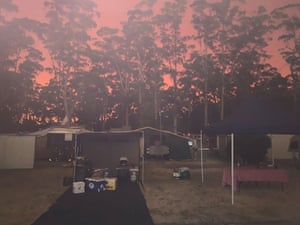

Dad came on the phone, croaky and exhausted. He’d saved their house but everything around them had burned. He said at one point there was fire 360 degrees around them. He’d walked into town and stood across the road as he watched Sally’s shop – with all her artwork – burn to the ground, along with his temporary office beside it. All their work was gone.
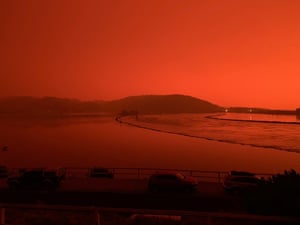
The previous evening we’d visited Dad and Sally to see their newly built place and share a housewarming bottle of champagne. There were burnt leaves falling from the sky – but that was happening everywhere we’d been, and locals were hoping that a southerly wind would push the fire back. We nearly left the kids with them for the night but made plans to go back to stay for New Year’s Eve.
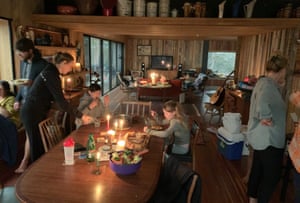
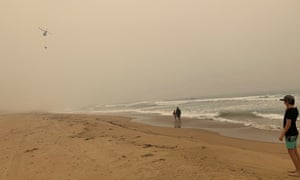
Later we went down to the beach, walking the sand with the birthday boy, getting to know him and like him, the kids asking every inappropriate kid question to discover his life story. We were the only people on the beach, enveloped in smoke haze. Helicopters flew overhead – a Blackhawk, several rescue helicopters – one carrying water for the fires. Our son waved up at them and they sounded sirens in greeting, hands waving down at us. That night we celebrated the birthday boy with a candlelit dinner of bream and salmon we caught off the beach and salad from the garden and wines just under room temperature from having been kept in the fast-thawing freezer. And then the power came back on! We screamed and laughed. The birthday boy had been given a bunch of seven-inch records as presents, mostly 80s classics, and he put them on loud as people got up to dance.
The next morning authorities were telling everyone to leave if they could. Many people couldn’t because, with the power out, there was no fuel to be had. And if you could get fuel you could only pay for it with cash, but ATMs weren’t working. And then the fuel ran out. But again we were lucky; we had cash and fuel. We packed up to go as fast as we could, helping to fireproof the house a bit. I wished I could have stayed and helped more. But all agreed if the roads were opened my family should get out. I fell in love with everyone in that house, so grateful and relieved was I to have been given somewhere safe and warm and fun to shelter while the world fell apart up and down the coast.
"For 90 minutes we did less than 20km/h but the sensation of actually moving on a highway was wonderful"
We set out north. From Moruya we took a back road up by the beaches past burnt trees, burnt villages, burnt animals. What would normally have been an hour-long drive to Ulladulla took five hours. The highway was choked with people trying to escape. And then it was announced that the highway north had been closed again due to a fire and fallen trees across the road. Thousands of cars were backed up, with the radio saying a night sleeping in the car was a possibility. There were conflicting messages coming from officialdom, most of what anyone could find out was from people calling in to ABC radio. We went into the Ulladulla Woolies, getting what we could from the fast-emptying shelves. All the fresh fruit and most of the vegies were gone. And nearly all the water. As we idled in the car on the Ulladulla high street, Gwenno cut rolls out the window to make lunch for us.
Someone came running over. It was an old work colleague from her previous job, a German guy, who happened to be walking by. Gwenno had no idea he was in the area. He was stuck, like us, with his young family. He told us another ex-work colleague of Gwenno’s had a family holiday house in Mollymook and he’d managed to track down a key. If we needed, both families could stay there the night.
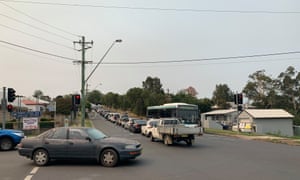
Google Maps and Live Traffic indicated an alternative route home to Sydney – but it was over the mountains towards Braidwood, where catastrophic fires had been burning for weeks, and would turn a three-hour drive into an eight-hour journey. But it was 2pm and we just wanted to get home so we decided to try it. The alternative route took us across the intersection at Milton – the last point where the highway had been closed – and we realised we’d now ended up at the front of the queue. If the highway was going to open, even temporarily, we’d have a chance of getting through. Gwenno called the traffic hotline, which warned us not to take the alternative route under any circumstances. It was largely dirt roads and the fire situation was unknown. So we sat tight, listening to radio updates and lying on our picnic blanket reading, watching the 18-month-old boy in the car behind us toddle around, followed by his patient young parents.
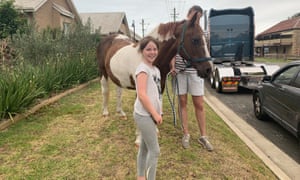
They dropped by our car and we traded information. She had a brother-in-law who worked in sanitation for Eurobodalla shire – he’d warned the council that if the power were cut the drinking water supply could be compromised and disease could break out. They’d brought in some generators from Newcastle but they hadn’t worked. A local woman came by handing out water for everyone trapped in the line. Later, as it got on towards 7pm, she brought homemade sausage rolls and tomato sauce for everyone for dinner. Another couple brought pieces of zucchini fritter. Another woman and her son brought tea. Another young woman walked her pony around so the kids could pat it. I told her about what had happened to my dad and Sally in Cobargo and she said she’d seen a picture of them in a news story. Her father-in-law had a similar story – he was renovating a new country home, with everything he owned stored in two shipping containers in a paddock. Both containers had burned, destroying everything.
The radio told us the police were going to start escorting cars up the burnt highway, 100 at a time. There was a flurry of movement, we edged forward 20 metres then stopped. Nothing happened for half an hour. Then the bloke towing a boat in front of me came back to say he was in communication via two-way radio with a mate who was working on the roads up the highway – the fire had got away from them, the decision had been made, they were calling it. The road would be shut for hours more. It was 10pm.
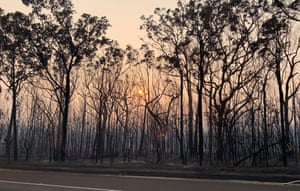
Gwenno’s old workmate came by; he had the key to the place in Mollymook. We headed down there and shared a warm beer as he and Gwenno caught up on what was happening in the business she’d left. I woke at 5am, looking out over the stunning view of Mollymook beach I hadn’t realised was there when we’d arrived in the dark. We got the sleepy kids out of bed, packed them into the car and drove. For 90 minutes we did less than 20km/h but the sensation of actually moving on a highway was wonderful.
And now I’m home. I feel great personal sadness for everything my dad and Sally have lost. But they still have their home and their lives. I feel a broader sadness for everyone down the south coast who has lost so much more. And I fear what is still to come for the area. I’m angry and frustrated and a bit hopeless at the lack of leadership and refusal to come to grips with what’s driving this catastrophe, and that with the onslaught of worsening climate change this is going to become a kind of new normal. I’m in tears. But I’ve also been overwhelmed by the love and generosity and goodwill and plain fucking human decency I’ve seen and experienced during this crisis.
• Timothy Lee is a writer based in Sydney
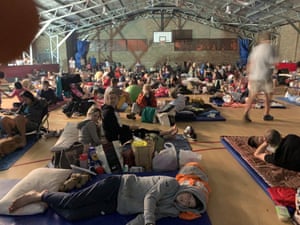
No comments:
Post a Comment